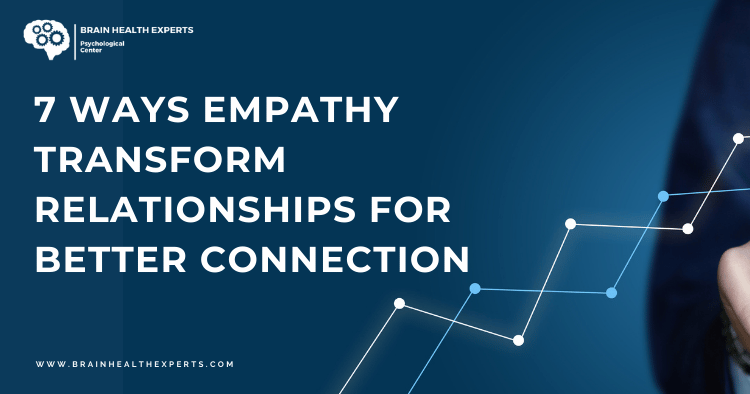Table of Contents
- Understanding Empathy
- Enhancing Communication
- Building Trust
- Fostering Conflict Resolution
- Encouraging Emotional Intimacy
- Cultivating Compassion
- Promoting Emotional Support
Understanding Empathy
Empathy is the ability to understand and share the feelings of another person. It’s a vital component in building and maintaining strong relationships. When we practice empathy, we put ourselves in someone else’s shoes, allowing us to connect on a deeper level.
“Empathy is not just about understanding; it’s about connecting.”
Key Aspects of Empathy:
- Cognitive Empathy: Understanding someone’s thoughts and feelings without necessarily feeling them yourself.
- Emotional Empathy: Feeling what another person feels, which creates a powerful bond.
To learn more about empathy, consider reading this article from the Greater Good Science Center.
Enhancing Communication
Effective communication is the backbone of any successful relationship. Empathy plays a critical role in how we convey our thoughts and feelings and how we receive those of others. When we approach conversations with an empathetic mindset, we are more likely to listen actively and respond thoughtfully.
“Listening is an art that requires attention over talent, spirit over ego, others over self.” — Dean Jackson
Tips for Enhancing Communication through Empathy:
- Practice Active Listening: Focus completely on the speaker, avoiding distractions. Nod and respond appropriately to show engagement.
- Reflect Back: Paraphrase what the other person has said to ensure understanding. For example, “It sounds like you’re feeling overwhelmed about work.”
- Avoid Judgment: Create a safe space for open dialogue by withholding judgment and criticism.
Benefits of Empathetic Communication:
| Benefit | Description |
|---|---|
| Greater Understanding | Empathy allows for a clearer understanding of each person’s perspective. |
| Reduced Conflict | When both sides feel heard, misunderstandings are less likely to escalate. |
| Strengthened Bonds | Open and empathetic communication fosters deeper connections. |
For more techniques to enhance your communication skills, check out 10 Positive Thinking Techniques to Reduce Stress.
Building Trust
Trust is essential in any relationship, and empathy is a powerful tool for building it. When individuals demonstrate understanding and concern for each other, they create a foundation of safety and security.
“Trust is built with consistency.” — Lincoln Chafee
How Empathy Builds Trust:
- Consistency: Showing empathy consistently helps others know they can rely on you.
- Vulnerability: Sharing your own feelings can encourage others to open up, reinforcing mutual trust.
- Nonverbal Cues: Body language, eye contact, and tone of voice can all convey empathy and foster trust.
Trust-Building Activities:
- Engage in honest discussions about feelings and expectations.
- Practice empathy by asking open-ended questions to encourage sharing.
To further explore how empathy influences relationships, you might enjoy 10 Ways Positive Thinking Transforms Your Relationships.
Fostering Conflict Resolution
Conflicts are inevitable in all relationships, but empathy can make resolving them easier. By understanding the emotions and motivations behind a disagreement, individuals are better equipped to find common ground.
“Conflict is inevitable, but combat is optional.” — Max Lucado
Conflict Resolution Strategies:
- Acknowledge Feelings: Recognize that both parties have valid emotions that deserve respect.
- Seek Solutions Together: Approach conflicts with a collaborative mindset, striving for a win-win outcome.
- Take a Break if Necessary: Sometimes, stepping away to process feelings can help in coming back to the conversation with a clearer mindset.
Resources for Conflict Resolution:
For more in-depth strategies, check out 10 Effective Strategies for Conflict Resolution in Relationships.
Encouraging Emotional Intimacy
Empathy significantly enhances emotional intimacy, allowing individuals to share their vulnerabilities and strengthen their connections. When partners feel understood and accepted, they are more likely to disclose their true selves.
“Emotional intimacy is about sharing your deepest thoughts and feelings.”
Ways to Cultivate Emotional Intimacy:
- Share Personal Experiences: Opening up about your own feelings can encourage your partner to do the same.
- Create Rituals of Connection: Regular check-ins or date nights can foster an environment of emotional sharing.
- Validate Each Other’s Feelings: Acknowledging each other’s emotions is crucial for deepening intimacy.
For additional insights into emotional intimacy, see 10 Ways Positive Thinking Boosts Emotional Well-Being.
Cultivating Compassion
Empathy leads to compassion, which is the desire to help those who are suffering. In relationships, this can manifest in numerous ways, from offering support during tough times to simply being present for one another.
“Compassion is the ultimate expression of your highest self.” — Russell Simmons
How to Cultivate Compassion in Relationships:
- Be Attentive: Notice when your partner is struggling and offer your support.
- Practice Kindness: Small acts of kindness can go a long way in showing you care.
- Encourage Self-Compassion: Remind each other to be gentle with yourselves during hard times.
Compassionate Activities:
- Volunteer together for a cause that matters to you both.
- Create a gratitude practice where you acknowledge each other’s efforts and contributions.
To explore more about positive thinking practices that can enhance compassion, consider reading 10 Simple Gratitude Practices to Boost Positive Thinking.
Promoting Emotional Support
Empathy is crucial for providing emotional support. When individuals feel understood and validated, they are more likely to turn to each other during times of need.
“Being there for someone is the best gift you can give.”
Ways to Offer Emotional Support:
- Be Present: Sometimes, simply being there for someone is the most powerful form of support.
- Ask How You Can Help: Instead of assuming what someone needs, ask them directly.
- Celebrate Achievements: Acknowledging each other’s successes helps create a supportive atmosphere.
FAQs about Empathy in Relationships
Q: How can I practice empathy daily?
A: You can start by consciously listening to others, showing genuine interest in their feelings, and reflecting on your own emotions to understand how they relate to others.
Q: What if I struggle with empathy?
A: It’s okay! Consider reading books on emotional intelligence or joining workshops that focus on developing empathetic skills. For more resources on emotional intelligence, check out Top 10 Must-Read Books on Emotional Intelligence 2024.
Q: Can empathy lead to burnout?
A: Yes, especially in caregiving roles. It’s important to balance empathy with self-care practices to maintain your emotional well-being.
Empathy is a transformative force in relationships, enhancing connection, trust, and understanding. By practicing empathy, we not only enrich our bonds but also create a more compassionate and supportive environment for ourselves and our loved ones. Start incorporating these principles today, and watch your relationships flourish! For further exploration of enhancing your mental well-being, visit Embracing a Happy, Healthy Life: Nurturing Your Mental Well-Being.





